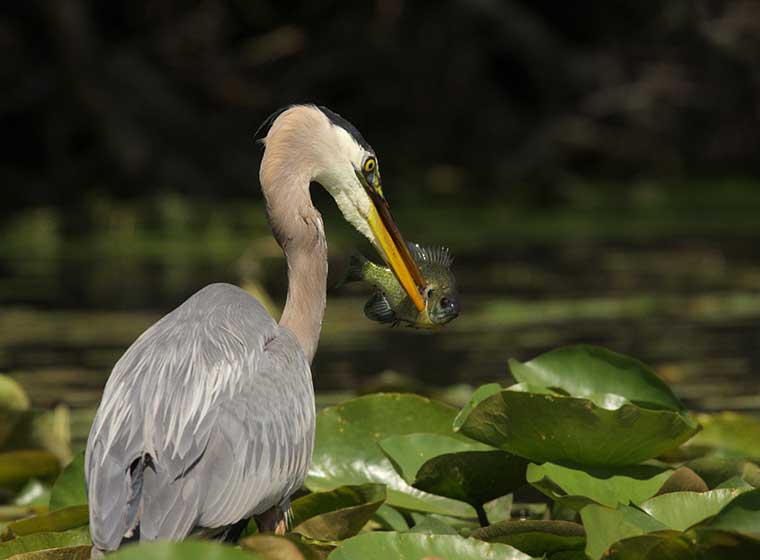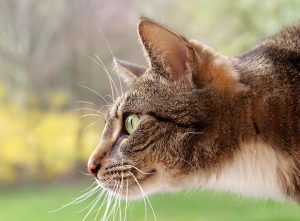Almost every pond owner will have experienced this frightening moment. You think of nothing bad, let your eyes wander over the pond and suddenly there he is: the heron. Maybe he is still sitting in some distance and scouts your garden pond. Or maybe he is already standing at the water’s edge and is after the pond’s inhabitants. Now it is time to act to prevent possible losses among the pond inhabitants. In this article you will learn how to protect your pond animals from pond predators.
The heron

The native gray heron is probably the most persistent of all pond predators. With its stilt-like legs, long beak and flexible neck, it is ideally equipped to fish innocent fish up to 35cm out of its own pond. Especially in spring, when the bird has to care for its young, pond protection is therefore the order of the day. Especially because the heron, which is under protection, is slowly recovering and the population numbers are increasing, it is becoming more and more of a problem. Once he figures out that he won’t be disturbed at your pond and has had some success fishing once, he becomes a permanent visitor and won’t rest until the whole pond is empty.
Fortunately, there are several ways to steal your pond away from the heron as a hunting ground. Our number one defense method of all is so-called heron scare devices, a combination of water gun and motion detector. When the device detects movement at the pond, a valve opens and a volley of water is “shot” over a larger area. This involuntary shower and the accompanying hissing sound work effectively against unwelcome guests. A similar variant is a device that produces a loud noise instead of a water projectile. With these defenses, you can drive away pond predators without harming the animals. And once the heron realizes that it is disturbed at every approach, it will soon look for another hunting ground.
Another possibility is a reflecting pyramid floating on the water. This turns in the wind on the water and thus reflects the sunlight. The resulting reflections successfully deter the fish predator. Such a mirror pyramid can be easily built by yourself with a little skill.
Pond design as protection
An important point in a heron-safe pond is the lack of a landing site. If the bird does not find a suitable landing site, it cannot even settle on the pond and begin its deadly game. Most of the time, gray herons land on or near the pond, at best in shallow shallow water. If you plant the pond bank densely with round stones, flower pots, garden sculptures and similar things on which the heron cannot sit well, you make it difficult for him to land. You can also prevent the pond predator from settling on the pond by cleverly planting the banks.
As already mentioned, the heron can also use larger shallow water areas as a landing strip. The best option here is to stretch a net over these areas. This may not look great, but it is an effective protection against unwanted approach in the pond zone. However, if small birds get caught in the net, it must be removed immediately.
A similar but more inconspicuous option here is to cover the entire pond area with thin floral wire or fishing line, which, depending on the species, even glistens in the sun and acts as a double deterrent. However, the installation here is more complex than with the pond net. The wires must be stretched across the pond in one direction at a distance of about 30cm, then again at right angles to it at a distance of about 50cm. This large grid extremely restricts the freedom of movement of the heron in the garden pond and makes this area unattractive for him. The problem with this, however, is the costly installation and the hindrance for work on the pond, such as removing leaves.
In some ponds, the installation of a dummy heron has also proven effective. Grey herons do not normally fish in waters that have already been given to another bird. However, if the heron notices that the strange bird hasn’t changed its position in days or weeks while scouting its potential new hunting ground for hours, it might smell a rat. So make sure you move the plastic bird regularly.
Our final suggestion is to use an electric fence. However, whether you want to use this defense on your own fence is up to each pond owner. Guaranteed, this solution is effective, but no protective measure against fish predators should end in cruelty to animals!
Other pond predators

Unfortunately, however, it is not only the heron that likes to attack its own fish. Storks, cormorants and kingfishers sooner or later also find their way to the pond and are further aerial threats. Also jays and cranes are not uncommon when the supply of “tasty fish” is easy to get.
The second most common fish predator, however, is the common house cat. It doesn’t even have to be the neighbor’s sneaky tomcat that fishes fish from the table. Even your own cat often shows no respect for the fishing ban you have imposed. It is therefore all the more important that you protect your pond animals from cats.
Effective here is also a pond cover net or water-splashing protective measures (such as the heron scare), which are also available with ultrasonic signal. However, with cats you can also simply make the pond environment “hunting-unfriendly”. To do this, you should first surround the pond with a large, shallow wet area, as most cats are water shy and would not risk getting wet paws. Fish will also not stay in the shallow water zone if there is danger. Therefore, this is a relatively safe solution, but it makes it easier for predatory birds. Better, you also design the pond bank with an aggravating embankment shape that makes pond fishing impossible for pousins with free access.

